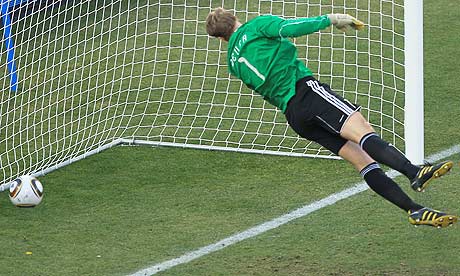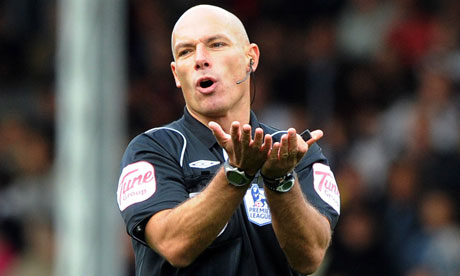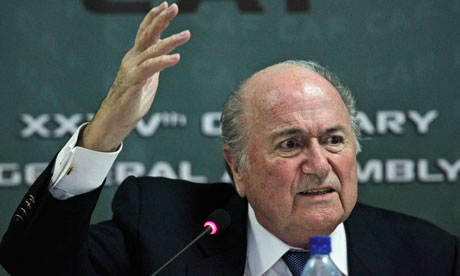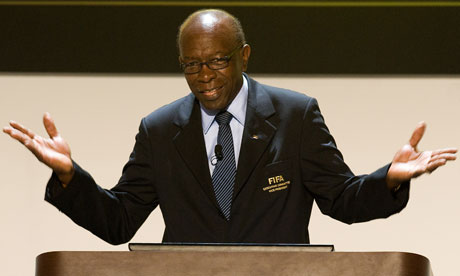The most prominent advocate against such technology is Michel Platini, president of UEFA and heir apparent to FIFA. Last year he explained that such technology was not necessary because missed calls were oh so rare:
"How often do you have an incident where there is a real doubt as to whether the ball crossed the line? Perhaps once every 40 years."
Platini said that once goal line technology had been accepted, then videos could be used to make other difficult decisions.Perhaps he had in mind the 1966 and 2010 World Cups during which England found itself on different sides of goal controversies in matches against Germany, with a questionable goal awarded in 1966 and a clear goal denied in 2010. Although England's two experiences with the goal line were many decades apart, recent experience shows that such controversies are fairly common in top flight football.
"I'm afraid that if you start with technology which is used once every 40 years, it could lead to other uses for the technology and I'm afraid that maybe this could lead to video refereeing," he said.
"I don't think this technology is really good for football."
Last Saturday's phantom goal at the San Siro was not even the only missed goal that day. Wolfsburg and Hoffenheim saw the exact same situation occur with an obvious goal by Hoffenheim not given (below). Hoffenheim prevailed in the end so the sense of injustice was much more muted than the draw in Milan. And earlier this month an A-League game saw yet another apparent goal not given.
Later this week the International Football Association Board -- the international body responsible for the rules of the game -- will discuss the initial results of trials with goal line technology with a decision set to be made in July, 2012.
That goal line technology is in any way controversial is remarkable. Platini's arguments seem to rest on three legs. First, that such controversies are rare. Second, that the introduction of technology for one aspect of the game would represent a slippery slope. And third, the game should be played in the same manner at all levels. Let's consider these arguments one at a time.
 First, Platini has backed off from his earlier claims that such events occur every forty years, stating earlier this week after the Milan-Juventus controversy: "A goal like that of the English at the 2010 World Cup against
Germany, which was wrongly not given, happens only once every few
years." He is still wrong. The three controversies in February, 2012 alone clearly show that goal line ambiguity is problematic for officials. So this argument can be dismissed.
First, Platini has backed off from his earlier claims that such events occur every forty years, stating earlier this week after the Milan-Juventus controversy: "A goal like that of the English at the 2010 World Cup against
Germany, which was wrongly not given, happens only once every few
years." He is still wrong. The three controversies in February, 2012 alone clearly show that goal line ambiguity is problematic for officials. So this argument can be dismissed.Second, Platini worries that goal line technology will lead to the use of technology in other areas of refereeing: "When I introduce a camera to keep the goals under surveillance I also need one for the surveillance of offside. There are 10 offsides per game." Here Platini's argument fails a basic test of logic. There is no reason why introducing technology to monitor one aspect of the game means that it would have to be introduced in other areas -- the IFAB would still make decisions on changes to officiating a case by case basis. Consider that the addition of additional officials on the goal lines for Champions League matches has not led to a slippery slope of ever more referees being added on the pitch -- there has been no slippery slope. On this issue, Platini was a strong advocate for changing the rules and his opposition to goal line technology demonstrates a marked inconsistency with his previous advocacy of changing the rules to help officials.
Third, the idea that the game should be played in the same manner at all levels is romantic and quaint, but is simply not how things are done. Consider that referees now routinely use communication systems (pictured sticking out of Howard Webb's ear to the left), in place since 2003. This technology is not available at all levels and its implemented has been seamlessly into top level matches with essentially no complaints. Of course, referee communications systems are but one of many examples of how the top level game is different than as played elsewhere (e.g., consider the extra referees discussed above.) Platini's argument is easily shown to be empirically incorrect.
To sum, the game would benefit from goal line technology, which actually is a minor innovation compared to the technologies that have been deployed to assist referees in sports such as tennis, American football, basketball, rugby and hockey. For soccer, where goals matter immensely, the implementation of goal line technology is a matter of improving the performance of the officials with no arguments that I can see against it that make much sense.






















